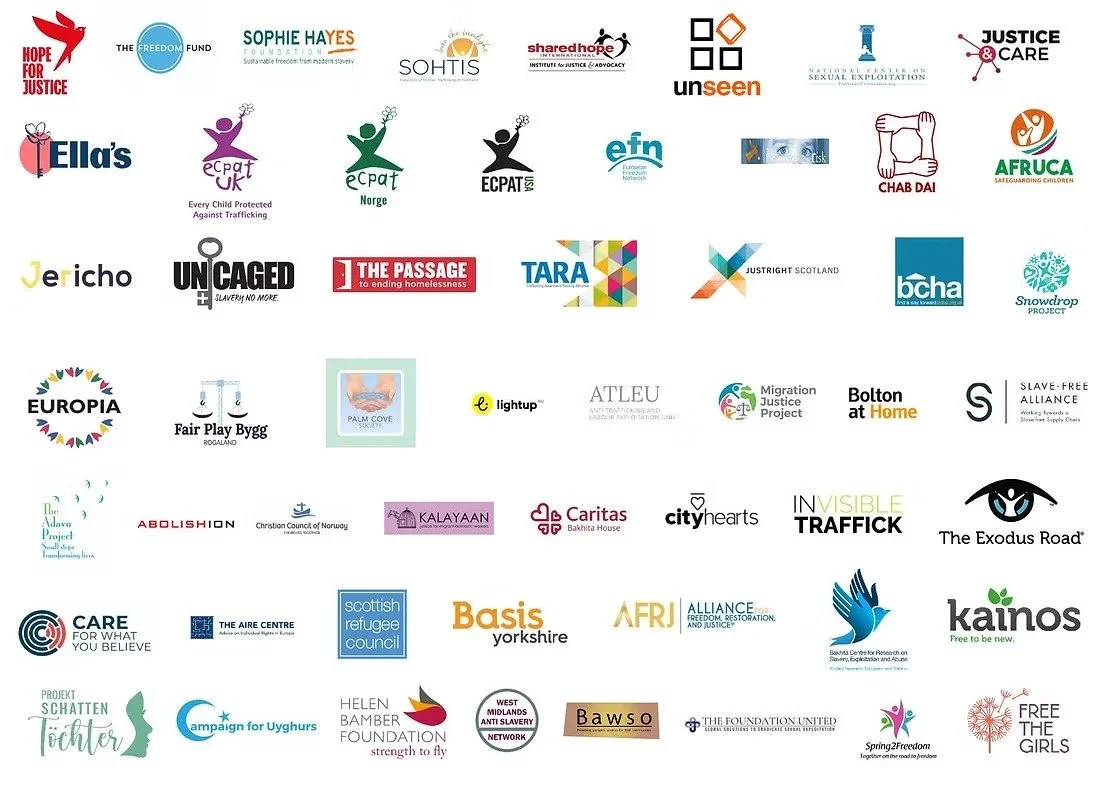Anti-slavery groups unite to condemn Ukraine invasion and trafficking impactMar 16, 2022
Leading non-profit groups in the fight against human trafficking say that Russia’s invasion of Ukraine is feeding instability and dramatically raising the risk of human trafficking to those fleeing from the region.
OPEN LETTER FROM THE ANTI-HUMAN TRAFFICKING COMMUNITY TO CONDEMN AND END THE RUSSIAN INVASION OF UKRAINE
We, a community of non-governmental organizations (NGOs) and anti-trafficking leaders who work to end human trafficking and modern slavery, declare in solidarity that we condemn the invasion of Ukraine launched by Russia on February 24, 2022.
In addition to being an act of aggression, a crime under international law and a flagrant violation of the United Nations Charter,1 the invasion will exacerbate the human trafficking of civilians in Ukraine and those fleeing from the country. We stand in solidarity to call on the Russian authorities to end the invasion.
The Russian Invasion of Ukraine and Significant Increased Risks of Human Trafficking
As of 10 March, 2022, over 2 million people have fled Ukraine2. The United Nations High Commissioner for Refugees (UNHCR) has said that the forced displacement in Ukraine “looks set to become Europe’s largest refugee crisis this century.”3 The majority of these refugees are women and children. Many more have been internally displaced, placing them at significantly increased vulnerability to human trafficking.
As long as the military invasion of Ukraine continues, the vulnerability of displaced people in the country to human trafficking will increase due to deteriorating rule of law and impunity; further forced displacement; humanitarian need and socio-economic stress and social fragmentation.
Human trafficking will also escalate in the countries to where people from Ukraine are fleeing. There have also been deeply concerning reports of attempts to traffic women and girls fleeing Ukraine in neighboring countries, including Poland and Romania.
Our Call to End the Invasion and Protect Civilians from Human Trafficking
We condemn the military invasion of Ukraine by Russia and call the Russian authorities to withdraw their troops immediately from Ukraine;
We call on the International Criminal Court and relevant judicial instances to investigate all potential war crimes, crimes against humanity and human rights violations associated with human trafficking in the context of the invasion, be investigated and brought to court;
We call on neighboring states and countries of asylum to prevent trafficking and protect refugees by ensuring that all responses to this crisis include a Counter Trafficking Strategy. This should include but not be limited to:
the training of all frontline agencies and citizens in spotting the signs of human trafficking to help prevent human trafficking and support victims and survivors;
wider prevention measures including safe and legal routes for those fleeing the conflict;
identification and restorative measures to enable the active identification of potential victims and ensure that survivors receive holistic trauma informed care;
measures to enable perpetrator accountability including through criminal and civil proceedings.
We call on the international community to assist receiving asylum countries in their financial, coordination and technical support of refugees and their protection from human trafficking, including the safe repatriation and return of citizens to their communities when safe to do so.
Further information can be located in the background information page.
1 Amnesty International, Russia/Ukraine: Invasion of Ukraine is an act of aggression and human rights catastrophe, 1 March, 2022. Available at: Invasion of Ukraine is an act of aggression and human rights catastrophe (amnesty.org),
2 BBC, How many refugees have fled Ukraine and where are they going? 10 March, 2022. Available at: https://www.bbc.co.uk/news/world-60555472
3 UNHCR mobilizing to aid forcibly displaced in Ukraine and neighboring countries, 1 March 2022. Available at: UNHCR - UNHCR mobilizing to aid forcibly displaced in Ukraine and neighbouring countries
Signatories
Tim Nelson, CEO, Hope for Justice and Slave-Free Alliance
Nick Grono, CEO, The Freedom Fund
Red Godfrey-Sagoo, CEO, Sophie Hayes Foundation
Joy M Gillespie, CEO, Survivors of Human Trafficking in Scotland (SOHTIS)
Linda Smith, Founder and President, Shared Hope International
Andrew Wallis, CEO and Founder, Unseen
Dawn Hawkins, CEO, National Center on Sexual Exploitation (NCOSE)
Christian Guy, CEO, Justice and Care
Helen Sworn, Executive Director and Founder, Chab Dai
Deb Sigmund, Founder, Innocents at Risk
Elizabeth Fisher Good, Founder & CEO, The Foundation United
Leanne Rhodes, Executive Director, European Freedom Network
Harriett Baldwin MP, Chair, British Group of the Inter-Parliamentary Union
Karen Bradley MP, UK Former Minister for Modern Slavery and Organised Crime Patricia Durr, CEO, ECPAT UK
Ann-Kristin Vervik, Generalsekretær/Executive Director, ECPAT Norway
Lori L Cohen, CEO, ECPAT USA
Richard Beard, CEO, Jericho Foundation
Mick Clarke, CEO, The Passage
Kim Westfall, Founder, Uncaged
David Gadd, Professor of Criminology
Bronagh Andrew, Operations Manager, The TARA Service
Kirsty Thomson, Managing Director, JustRight Scotland
Martin Hancock, CEO, BCHA 25. Emily Chalke, Co Director, Ella’s House
Lara Bundock, CEO and Founder, Snowdrop Project
Kush Chottera, CEO, Europia
Fred Sherling, General Manager, Fair Play Bygg Rogland Norway
Yvonne Hall, Founder and Co-Chief Executive, Palm Cove Society
Ragnhild Lindahl Torstensen, CEO, Lightup Norway
Victoria Marks, Director and Solicitor, Anti Trafficking and Labour Exploitation Unit Liz Griffith, Head of Policy and Research, Migration Justice Project at Law Centre Northern Ireland Law Centre
Jon Lord, CEO, Bolton at Home
Dr Carole Murphy, Director, Bakhita Centre for Research on Slavery, Exploitation and Abuse
Dr Ruth Van Dyke, Acting Director, Training Bakhita Centre for Research on Slavery, Exploitation and Abuse
Rev Ian Howarth (Adavu Chair) and Liisa Wiseman (Adavu Project Manager) Adavu Project
Leanne Rhodes, CEO and Founder, Abolishion
Erhard Hermansen, General Secretary, Christian Council of Norway
Rita Gava, Director, Kalayaan
Karen Anstiss, Service Manager, Caritas Bakhita House
Wanjiku Ngotho-Mbugua, Acting Chief Executive, Bawso
Ed Newton, CEO, City Hearts
Gayle Bunting, Director, Invisible Traffick
Amber Cagney, Development Manager, West Midlands Anti-Slavery Network
Ross Hendry, CEO, Christian Care Research and Education (CARE)
Matthew Evans, Director, The AIRE Centre
Jillian McBride, Children’s Policy Officer, Scottish Refugee Council
Moya Woolven, CEO, Basis Yorkshire
Modupe Debbie Ariyo OBE, CEO, AFRUCA
Ashleigh Chapman, President, AFJR (Alliance for Freedom, Restoration and Justice)
Rushan Abbas, Executive Director, Campaign for Uyghurs
Coreen Lategan, Executive Director, Kainos e.V. Germany
Bettina Kneisler, First Chairperson, Projekt Schattentöchter e.V.
Rachel Witkin, Head of Counter-Trafficking and Publications, Helen Bamber Foundation
Anja Slabbekoorn, President, Spring2Freedom
Andrew Hoskins, Vice President of International Programs, The Exodus Road
Courtney Skiera-Vaughn, Director of International Programs, Free The Girls
BACKGROUND INFORMATION
Human Trafficking and Other Forms of Modern Slavery(4)
An estimated 40.3 million people are currently trapped in modern slavery, including 24.9 million in forced labor(5) Human trafficking is also the second largest criminal enterprise in the world, generating the equivalent of US $150 billion annually.(6)
Human trafficking is a transnational crime and a human rights violation codified in international human rights and refugee law, and international criminal law.7
Human Trafficking during Military Invasions and Armed Conflict
In 2020, a record 80 million people were forcibly displaced in their own countries or abroad due to war, military invasion or armed conflict. (8)
Human trafficking and conflict feed each other. Traffickers are typically aware of the lack of options displaced individuals have and can offer to fill this void. By promising stability, security and employment, traffickers often appear to offer a greater prospect of hope for individuals who might have left everything behind.
Survivors of trafficking who are displaced, often fear returning to their locations or countries of origin due to threats by traffickers and criminal gangs made against them and their families.
Large numbers of people may be displaced either within their country or across borders, living with considerable physical insecurity and limited access to protection and assistance. In these contexts, the risks of human trafficking are exacerbated, especially for women and unaccompanied or separated children living in desperate circumstances.
Enslavement, committed as part of a widespread or systematic attack directed against any civilian population, is considered a crime against humanity and a war crime in times of war. (9)
In the context of a military invasion, human trafficking should be viewed as not only as a human rights violation and a potential war crime, but also an international security concern. The illicit funding behind human trafficking is fueling global instability and insecurity.
(4) Human trafficking is the unlawful act of transporting or coercing people in order to benefit from their work or service typically in the form of forced labor or sexual exploitation and other forms of modern slavery, UNODC, Human Trafficking Factsheet, accessed 6 March 2022. Available at: Human-Trafficking (unodc.org)
(5) ILO, Global Estimates of Modern Slavery, 2017. Available at: wcms_575479.pdf (ilo.org)
(6) ILO, Profits and Poverty: The Economics of Forced Labor, 2014, https://www.ilo.org/global/publications/ilo-bookstore/order-online/books/WCMS_243391/lang--en/index.htm
(7) United Nations Convention against Transnational Organized Crime and its two related protocols: the United Nations Protocol to Prevent, Suppress, and Punish Trafficking in Persons, Especially Women and Children, and the United Nations Protocol against the Smuggling of Migrants by Land, Sea, and Air, (2003-2004). Slavery Convention (1926) and the Supplementary Convention on the Abolition of Slavery, the Slave Trade, and Institutions and Practices Similar to Slavery (1956). The Universal Declaration of Human Rights (1948), the International Covenants on Civil and Political Rights (1966), The United Nations Convention for the Suppression of the Traffic in Persons and of the Exploitation of the Prostitution of Others (1949), and the Convention on the Elimination of all Forms of Discrimination Against Women (1979). Available at:


